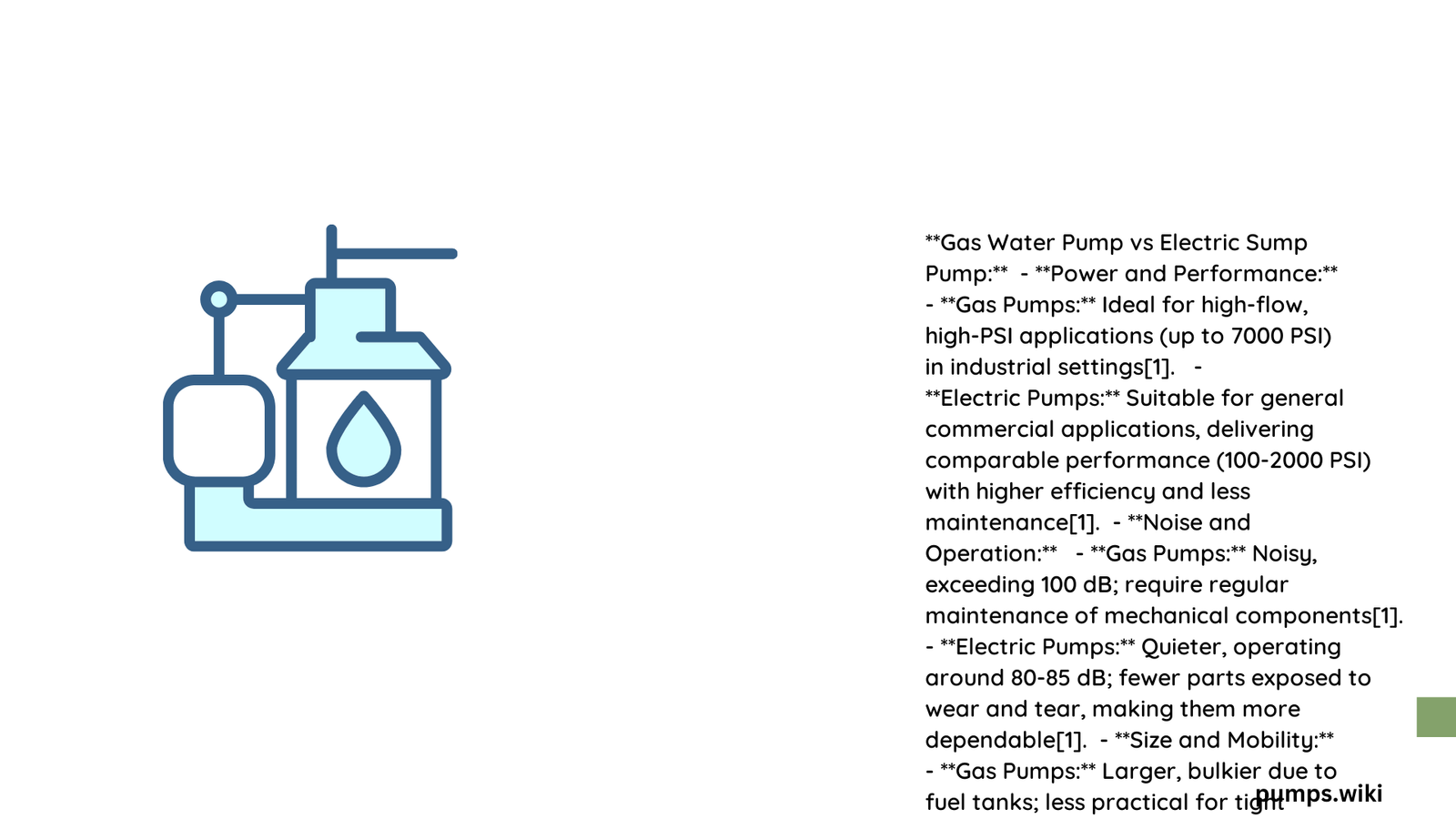When choosing between a gas water pump and an electric sump pump, homeowners and professionals face a critical decision that impacts performance, cost, and efficiency. These two pump types offer distinct advantages and limitations across various applications, from flood prevention to industrial water management. Understanding their unique characteristics helps select the most appropriate solution for specific water removal and transfer needs.
What Are the Core Differences Between Gas Water Pumps and Electric Sump Pumps?
Performance Capabilities: How Do They Compare?
Flow Rate and Pressure Analysis
| Pump Type | Average Flow Rate | Pressure Range | Best Use Cases |
|---|---|---|---|
| Gas Water Pump | 500-7000 GPH | 100-7000 PSI | Industrial applications, construction sites |
| Electric Sump Pump | 1000-1800 GPH | 50-250 PSI | Residential basement water removal |
Gas water pumps typically excel in high-demand scenarios requiring substantial water movement, while electric sump pumps specialize in consistent, reliable water management for residential environments.
Power Source: What Makes Them Different?
Gas Water Pump Power Characteristics
- Requires gasoline or propane fuel
- Higher initial power output
- Less environmentally friendly
- More complex fuel management
- Suitable for remote locations without electrical access
Electric Sump Pump Power Characteristics
- Plugs into standard electrical outlets
- Consistent, predictable performance
- Lower operational costs
- Environmentally friendly
- Ideal for indoor and residential applications
Cost Considerations: Which Option Saves Money?
Operational Expense Breakdown
- Gas Water Pump Costs
- Higher fuel expenses
- More frequent maintenance
- Replacement parts more expensive
-
Potential environmental compliance costs
-
Electric Sump Pump Costs
- Lower electricity consumption
- Minimal maintenance requirements
- Longer operational lifespan
- Predictable energy expenses
Maintenance Requirements: How Complex Are They?
Gas Water Pump Maintenance
- Regular oil changes
- Spark plug replacements
- Air filter cleaning
- Carburetor adjustments
- More technical expertise required
Electric Sump Pump Maintenance
- Periodic float switch inspection
- Cleaning intake screens
- Battery backup system checks
- Minimal technical knowledge needed
- Less frequent service intervals
Environmental Impact: Which Is More Sustainable?
Ecological Considerations
- Gas Water Pumps
- Higher carbon emissions
- Potential fuel spillage risks
-
Less energy-efficient
-
Electric Sump Pumps
- Lower carbon footprint
- No direct emissions
- Compatible with renewable energy sources
- More environmentally responsible choice
Portability and Flexibility: Where Can They Be Used?
Mobility Factors
- Gas Water Pumps
- Heavier (50-200 pounds)
- Larger physical dimensions
- Better for outdoor, remote locations
-
Requires fuel transportation
-
Electric Sump Pumps
- Lightweight (20-50 pounds)
- Compact design
- Easy indoor/outdoor installation
- Minimal transportation requirements
Recommended Applications
Ideal Scenarios for Gas Water Pumps
- Construction sites
- Agricultural irrigation
- Emergency flood response
- Remote location water management
- High-volume water transfer
Ideal Scenarios for Electric Sump Pumps
- Residential basement water removal
- Crawl space drainage
- Indoor flood prevention
- Commercial building water management
- Consistent, low-volume water transfer
Final Recommendation

Choose a gas water pump for high-volume, remote applications requiring substantial power. Select an electric sump pump for consistent, energy-efficient water management in residential and controlled environments.
Conclusion
Understanding the nuanced differences between gas water pumps and electric sump pumps empowers users to make informed decisions based on specific requirements, budget constraints, and environmental considerations.
